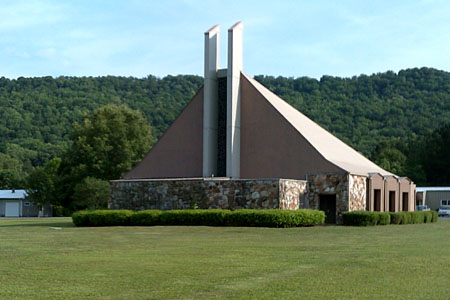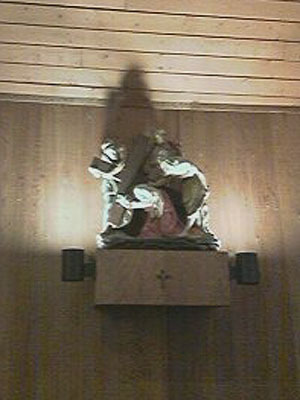| |
 |
 |
 |
| Comment on this report, or find other reports. |
 |
| Our Mystery Worshippers are volunteers who warm church pews for us around the world. If you'd like to become a Mystery Worshipper, start here. |
 |
| Find out how to reproduce this report in your church magazine or website. |
|
|
| 2458: St Judeís,
Scottsboro, Alabama, USA |
 |
 |
 |
Mystery
Worshipper: William Dewy.
The church:
St Judeís Scottsboro, Alabama, USA.
Denomination:
Roman Catholic,
Diocese
of Birmingham in Alabama.
The building:
The edifice was built on a lovely 10 acre plot on July Mountain,
just south of the city of Scottsboro, Alabama. The brick and
stone structure is attractive from the outside. Inside, the
narthex seems more comfortable and inviting than the church.
The interior is wide but not particularly deep; no pew is far
from the altar. The electric lighting is stark and too much
focused straight down or straight up, creating ghastly shadows.
A gold colored domed cylinder of a tabernacle, looking very
much like a cappuccino machine, dominates the front.
The church:
They have an active and seemingly well organized chapter of
the Knights of Columbus. There is a Saturday vigil mass and
two Sunday masses, one in English and the other in Spanish.
During the week there is an evening mass on Wednesdays but a
morning mass on other days.
The neighborhood:
Scottsboro is the county seat of Jackson County, Alabama. In
1931 nine African-American teenage boys were tried in Scottsboro
for rape and sentenced to death, even after one of their accusers
recanted and admitted that the charge was a fabrication. After
two retrials, charges were dropped for several of the boys and
the death sentence was commuted for all but one of the others.
The boy sentenced to death escaped and remained in hiding until
1976, when he was pardoned by Governor George Wallace. The incident
of the Scottsboro Boys is widely regarded as a gross miscarriage
of justice and has been examined in literature, music, theatre,
film and television. On a lighter note, Scottsboro's First Monday
Trade Days, begun in 1902 as an occasion for horse swapping,
continues to this day as an open-air market attracting hundreds
of vendors.
The cast:
The Revd Alan C. Mackey, pastor, was celebrant and preacher.
The date & time:
Feast of Our Lady of the Rosary, Saturday, October 6, 2012,
5.00pm.
What was the name of the service?
Saturday Vigil Mass.
How full was the building?
About 100 people were present in a church that could have held
a few hundred.
Did anyone welcome you personally?
People smiled and said hello in the parking lot. A man held
the door open and nodded a friendly greeting.
Was your pew comfortable?
Yes, the wooden pew and the kneeler were quite comfortable.
How would you describe the pre-service
atmosphere?
The faithful were just finishing a recitation of the Rosary as I arrived. The atmosphere was quietly reverent.
What were the exact opening words of the
service?
"Good evening and welcome to St Judeís."
What books did the congregation use during the
service?
The Seasonal Missalette.
What musical instruments were played?
Electronic organ for which no organist was present. The instrument
was played via a pre-recorded computer program. The three Marian
hymns were pitched in a range I found too high or too low to
sing the melody.
Did anything distract you?
I was rather distracted by the statues of the Stations of the
Cross. They were very large for the church, and also were illuminated
with can lights focused upward, like footlights, complete with
looming shadows. I was also somewhat mystified by the order
in which people received communion. Ushers dismissed the people
from the back pews first and moved forward.

Was the worship stiff-upper-lip, happy clappy, or
what?
The service was formal but not stiff; reverent but not slow; and a bit mechanical without being perfunctory. It was liturgically conservative. Some women had veils or mantillas on their heads. Although there was no altar rail, a litany desk was provided for communicants to receive kneeling if they desired to do so.
Exactly how long was the sermon?
12 minutes.
On a scale of 1-10, how good was the preacher?
7 – Father Mackey used the sermon primarily as a time of
teaching.
In a nutshell, what was
the sermon about?
The pastor gave a history of the feast of Our Lady of the Rosary,
which was instituted by Pope Pius V in thanksgiving for the
great naval victory over the Turks at the battle of Lepanto
in 1570, a favor attributed to the faithful having recited the
Rosary. From Maryís divine maternity,
he transitioned into showing honor and respect for traditional
marriage and family.
Which part of the service
was like being in heaven?
The Sanctus, the Angus Dei, and the doxology at the end of the
eucharistic prayer. All were sung a cappella in Latin.
And which part was like being in... er... the other place?
The electric lighting, which was generally aimed straight down,
created dark shadows. The saintsí eyes appeared to be sockets.
What happened when you hung around after the service looking lost?
The people were friendly, and smiled and nodded, but didnít
engage in conversation with me. A small group replaced a burned
out light bulb.
How would you describe the after-service
coffee?
None was offered.
How would you feel about making this church your regular (where 10 = ecstatic, 0 = terminal)?
5 – Despite the peopleís general friendliness, I didnít
get much sense of joy here. Be grateful youíre Catholic, Amen.
Did the service make you feel glad to be a
Christian?
It didnít make me sad to be a Christian.
What one thing will you remember about all this in seven days' time?
The disagreeable lighting. |
|
|
 |
 |
 |
| We rely on voluntary donations to stay online. If you're a regular visitor to Ship of Fools, please consider supporting us. |
 |
 |
 |
| The Mystery Pilgrim |
 |
| One of our most seasoned reporters makes the Camino pilgrimage to Santiago de Compostela in Spain. Read here. |
 |
 |
 |
| London churches |
 |
| Read reports from 70 London churches, visited by a small army of Mystery Worshippers on one single Sunday. Read here. |
| |
|
|
|
|


